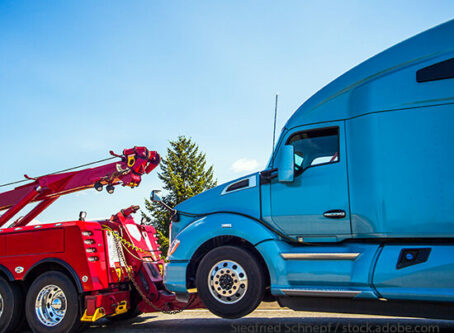States pursue, act on fuel tax rate changes
Fuel tax rates are a trending transportation topic at statehouses from Utah to Pennsylvania.
Advocates for trimming fuel tax collection at the state level say the time is right for the move. They cite new federal dollars for transportation purposes, higher fuel costs, and budget surpluses that could cover reductions in fuel tax collections.
Missouri
Multiple Missouri bills would provide some tax relief for all highway users.
A two-year-old law will increase the 17-cent fuel tax rate by 12.5 cents to 29.5 cents over five years. A fuel tax rebate program is available for many residents.
The first installment of annual 2.5-cent increases took effect in October 2021. The second installment went into effect on July 1. The tax rate now is set at 22 cents for gas and diesel purchases. Additional 2.5-cent increases are set to take effect each July through 2025.
Missouri residents are able to go through a refund process for the additional fuel tax collection. Refunds, however, are limited to owners of vehicles weighing up to 26,000 pounds.
House lawmakers voted 100-40 on Tuesday, April 4, to revise the rule.
One provision would remove the weight limitation. As a result, HB519 would allow Missouri-based truck operations to take advantage of the refund offering.
Another provision would require the state to develop a mobile app that allows a tax refund claim to be submitted at the time of purchase.
One more change would sync the refund process with the tax year and not the fiscal year, as is used in the current rule.
HB519 awaits assignment to committee in the Senate.
A related bill, SB259, in the Senate Transportation Committee would add Missouri-based truck operations to the rebate program.
Two more bills, SB260 and SB454, would simply repeal the tax increases and return the rate for gas and diesel to 17 cents.
Sen. Mike Moon, R-Ash Grove, says the state should relieve some tax burden on Missourians because roads are in good shape.
Ohio
An Ohio Senate bill would provide relief for truckers and motorists from a recent increase in fuel tax rates.
A 2019 transportation budget deal included raising the 28-cent fuel tax rate to 38.5 cents for gas and from 28 cents to 47 cents for diesel.
Sen. Stephen Huffman, R-Tipp City, wants to return the gas and diesel tax to the 2019 rate. His bill, SB48, would implement the rate reductions on Jan. 1, 2024. Huffman has said money coming into Ohio from the federal infrastructure law would offset the $1.5 billion annual revenue loss.
Gov. Mike DeWine is opposed to lowering the state’s fuel tax rates. The Republican governor maintains that any plan to lower fuel tax rates would be “a mistake.”
The bill is in the Senate Transportation Committee.
Pennsylvania
One bill halfway through the Pennsylvania statehouse is touted to reform the state’s fuel tax collection.
On Jan. 1, Pennsylvania’s 57.6 gas tax rate increased 3.5 cents to 61.1 cents per gallon. The 74.1-cent diesel rate rose 4.4 cents to 78.5 cents.
The changes are due to the state’s variable-rate fuel taxes.
Since 2013, the state taxes increase automatically when the average fuel price exceeds $2.99 per gallon. The Pennsylvania Department of Revenue determined that over the past year, the average price statewide exceeded that amount triggering the latest increase.
The Senate voted 29-19 to advance a bill to put a stop to automatic increases in gas and diesel excise taxes.
Led by Senate Transportation Committee Chairman Wayne Langerholc, R-Cambria, the bill would roll back the excise tax rates to the amounts collected on Dec. 31. Additionally, the average wholesale price would be set permanently at $2.99 per gallon.
Langerholc has said the changes would end automatic tax increases.
“My legislation will cut the gas tax before hardworking families must pay the second highest gas tax in the nation,” Langerholc said in a previous news release. “At a time when our constituents are faced with rising costs at the pump, grocery store and utility bills, no elected official should be voting against this legislation.”
Instead, advocates say lawmakers should be responsible for making decisions on possible fuel rate increases.
The Senate-approved bill, SB35, and the House version, HB76, are in the House Finance Committee.
Texas
Efforts underway in the Texas Legislature would authorize additional fuel taxes.
The state now collects a 20-cent-per-gallon excise tax on gas and diesel purchases. According to the Texas comptroller, the rate is unchanged since October 1991.
One bill would significantly raise the excise tax. SB254 would increase the 20-cent excise rate to 40 cents for gas and diesel purchases.
The change would take effect on Sept. 1.
Sen. Sarah Eckhardt, D-Austin, says that updating the gas and diesel tax is only a component of how the state should cover needed transportation revenue. Sources touted on her website include tolls and other user taxes “that can capture and fund increases in alternative transportation of goods, people, services and information.”
Another bill would index the excise tax to the highway cost index. Specifically, HB321 would authorize the tax rate to increase or decrease each Jan. 1 based on the cost of certain highway projects.
Rep. Ray Lopez, D-San Antonio, has said that indexing would allow the tax rate to keep pace with the rate of rising costs of highway construction and add long-term stability.
A separate bill would open the door to local fuel tax collections.
The lengthy transportation bill, HB2226, includes a provision to permit municipalities to impose a penny tax on gas and diesel purchases.
Additionally, the tax rate would be linked to the consumer price index. The distinction would authorize adjustments each January.
Voters in each municipality would need to approve any local fuel tax collection.
Utah
Utah Gov. Spencer Cox has signed a series of bills enacting tax cuts.
One bill covers the state’s fuel tax rate. Utah now charges a 36.4-cent tax on gas and diesel purchases. The rate is up 4.5 cents from one year ago. Rep. Mike Schultz, R-Hooper, recently told a House committee the increase was due to the fuel price jump following the Russian invasion of Ukraine.
The Utah Tax Commission adjusts the fuel tax rate each July. The commission recalculates the rate by charging 16.5% of the average motor fuel price charged by refineries to retailers at the rack.
Previously HB301, the new law changes the calculation of the fuel tax, and increases all vehicle registration fees by $7.
The fuel tax provision lowers the fuel tax rate to 34.5 cents starting July 1. The change will result from dropping the rack rate from 16.5% to 14.2%.
The rate will be increased to as much as 42 cents in 2028.
The change is estimated to reduce state tax revenues by about $35.4 million in fiscal year 2024. Another $31 million loss is anticipated the following year.
To help cover revenue loss, the new law adds a 12.5% tax on electricity from electric vehicle charging stations. LL









